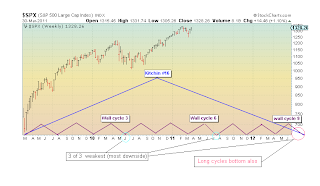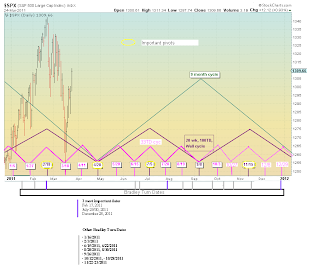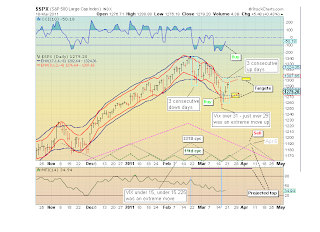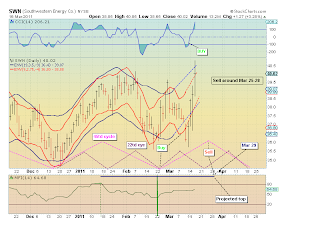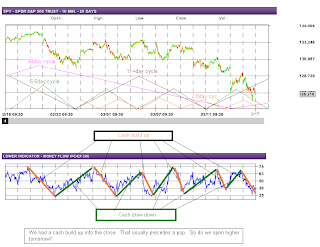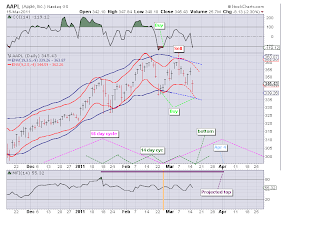Last week I told you that the market would trade the top of a 1295-1335 range on Mon/Tue and the bottom of the range Thu/Fri (Wed was a transition day). The market broke slightly below 1295 and never quite reached 1335. Not a bad call - pretty much as the week played out.
I usually don't comment much about news and current events. I leave that to people much better versed than I am to do that. But, given all the news this weekend about the catastrophe in Japan I feel comments are justified. This could get much worse if there is a nuclear reactor melt down. There is no way to predict the total impact at this time. We do know that the losses are going to be tremendous in life and property.
So who is going to pay for those losses? In many cases it will be insurers and re-insurers. So where will the get the money to pay for these losses? Well - insurers set up reserve funds so they can pay in cases like this. Those reserves to a large degree are invested in fixed rate investments. Think government securities. To pay claims these insurers will have to liquidate these investments. This means additional supply of these assets will hit the markets over the next several months. Not only that - these insures will not be buying at government bond auctions.
Not only that Japan is one of the largest holder/buyers of US Treasuries - second only to China. Now I can imagine Japan may need to also raise tens of billions (maybe hundreds of billions) of cash as they have to invest large sums in repairing their infrastructure.
Note: China just announced a trade deficit and they may not be in the market as much as in the recent past.
Suppose the US Treasury held a bond auction and no one showed up. Does the Fed step in and buy the bonds? Or, does interest rates increase to attract buyers? Probably some of both. In short it seems to me that the Fed may well lose control and be unable to maintain interest rates near zero. Not that the won't try - think QE3 super sized.
Now all this is not going to happen Monday (or even next week), but over a period of months. How does this align with the long term cycles (1-4 years)? I thought you would never ask. It is spooky and almost as if these cycles anticipated something like this. Didn't we just have the 4 year cycle top this past week (2nd anniversary of the March 2009 low)? That is the claim of some as I blogged last week. We had the 1 year cycle top in mid-January. We had the Kitchin cycle top in February (41 month cycle). Take a look:
Now I am not saying we get an instant market crash because of what happened in Japan. But, when you are talking about the world's third largest economy - it will have an impact which I believe could be substantial over the next several months. I would not be surprised to see some sell down Monday morning though as the scope of this catastrophe becomes clearer.
So what does the shorter cycles say about next week? We have an 11td cycle turning up and up for the week. We also have a 30td cycle that is set to turn up . The Wall cycle is down (may be what I have labeled as a 90td cycle?). So this combination of shorter cycles suggest an up week (as I suggested we may start the week with a down open). So let's say a range of 1290-1330 next week - starting near the bottom of the range on Monday and advancing throughout the week. We may continue to have volatility through the week with 10 or more point swings on the S&P.
See for yourself:
Finally what does Monday look like? Let's look at the short cycles. The 5.5td cycle turned up Friday and will be up the first couple of days of the week. The 2.8 day cycle will be down most of the day. These cycles will offset to a large extent Monday. So the 11td and 30td cycles will largely control the action on Monday. So Monday should be an up day. Here are the shorter cycles:
GL traders. These are volatile times so be sure your stops are in place. A nuclear melt down in Japan could override these shorter cycles and their market impact, so it is imperative you have stops and keep a close eye on the market next week. You may have to turn on a dime.



